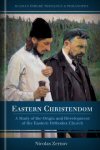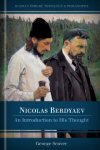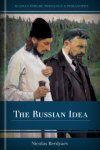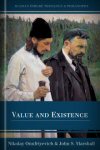Russian Émigré Theology & Philosophy (4 vols.)
Digital Logos Edition
Overview
A Russian émigré was someone who emigrated from Russia during the period of the Bolshevik revolution and the Soviet takeover of the Russian Empire in the early part of the twentieth century. These people found themselves in a number of different nations, including both Germany and France. The cities of Berlin and Paris evolved into thriving émigré communities, and were often centers of Russian theological, philosophical, and political thought during the twentieth century. The nationalism of the scholars and theologians associated with the émigré movement was driven by a deeply felt notion that the Soviet ethos was entirely non-Russian, and that true Russian philosophy and thought was being preserved outside of her borders. As a result, this period of history led to a widespread missionary movement on the part of the Russian Orthodox Church abroad, carrying the Orthodox Gospel to several nations for the first time in history. This collection provides works that are representative of various perspectives of émigré thought, covering everything from an historical overview of the Orthodox Christian Church to the existentialist, political philosophy of Nicolas Berdyaev. A must-have set for anyone interested in early-twentieth century politics, theology, or philosophy.
With the Logos edition, all Scripture references are tagged and appear in your favorite translation on mouseover. Each volume is completely searchable, so you can trace the connections between various themes, events, and historical figures in the Russian Christian and philosophical traditions like never before. You can also cross-reference related texts at the touch of a button, and all your dictionaries and other reference tools are just a click away.

Key Features
- Thorough introduction to Russian émigré philosophy and theology
- Detailed, historical overview of the Russian Orthodox Church and her place in the modern world
- Examination of the existential, Christian philosophy of Nicolas Berdyaev
- Musings on the idea of Russia as the “Third Rome”
- The idea of Christian universalism from a Russian perspective
Product Details
- Title: Russian Émigré Theology and Philosophy (4 vols.)
- Volumes: 4
- Pages: 926
Individual Titles
- Eastern Christendom: A Study of the Origin and Development of the Eastern Orthodox Church by Nicolas Zernov
- Nicolas Berdyaev: An Introduction to His Thought by George Seaver
- The Russian Idea by Nicolas Berdyaev
- Value and Existence by N. O. Lossky
This title is included in the following collections
You can save when you purchase this product as part of a collection.
Logos 6 Orthodox Silver Legacy...
$349.99$349.99Logos 6 Orthodox Gold Legacy L...
$849.99$849.99Logos 9 Orthodox Gold Legacy L...
$849.99$849.99Logos 6 Orthodox Platinum Lega...
$1,499.99$1,499.99
- $1,499.99
- $2,999.99$2,249.99
- $2,999.99
- $2,999.99
- $4,749.99$3,562.49
- $4,749.99
- $7,749.99
- $23,999.99$17,999.99
- $21,749.99
- $24,999.99

This work provides a detailed overview of the history of Orthodox Christianity in the East, beginning with the tumultuous first through fourth centuries and culminating in a discussion on the interaction between the Orthodox Church and the contemporary world of the mid-twentieth century.
Nicolas Zernov (1898–1980) was a Russian Orthodox scholar and historian, a layman in the Orthodox Church, and an émigré to Britain after the start of the Russian revolution. He was also a significant contributor to the Anglican-Orthodox ecumenical movement of the early twentieth century, and a close associate of Fr. Georges Florovsky.

This book is a semi-biographical introduction to the religious and political philosophy of Nicolas Berdyaev (Nikolai Aleksandrovich Berdyaev). A close friend of Sergius Bulgakov, Berdyaev’s philosophy focused on the ideas of both creativity and freedom, a sort of Christian existentialism.
George Seaver was a noted author, authoring biographical accounts of the lives of Albert Schweitzer and Edward Wilson, while also writing a children’s book titled Bam: The Story of an African Boy.

This monumental political and philosophical work discusses the idea of Moscow as the “Third Rome,” the schism of the seventeenth century and its impact on those claims, the reforms of Peter the Great, Christian universalism, and more.
Nicolas Berdyaev (1874–1948) was a Russian émigré theologian and political philosopher. He was expelled from Russia by the new Soviet government in 1922, first journeying to Berlin, but eventually settling with his wife in Paris, France in 1923. He went on to write 15 books during his time in France, passing away on his own writing desk in Clamart, France in March of 1948.

Drawing heavily from Neo-Platonic philosophy and the writings of early Church Fathers, Lossky outlines a sort of metaphysical libertarianism that focuses on the idea of uncreated energy or potential in all people, along with the reconciliation of opposing forces, or “sobornost.” This work discusses themes such as value, the nature of consciousness, truth, beauty, goodness, and the fulness of life.
Nikolay Onufriyevich Lossky (1870–1965) was a heavily influential Russian philsopher and the father of Russian Orthodox theologian Vladimir Lossky. His philosophical perspective was called intuitive-personalism, and he was also known for espousing ideas of both libertarianism and idealism in his writings. While born in the Russian Empire, he would end his life in France as a Russian émigré during the Bolshevik rule.
Reviews
3 ratings
AeliusCicero
8/7/2015

G
5/1/2015

Larry Proffitt (I
4/18/2015